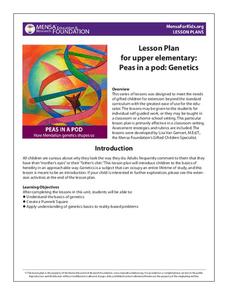EngageNY
Mid-Unit Assessment: Close Reading of Bullfrog at Magnolia Circle: Bullfrog Life Cycle
The sixth lesson plan in this Bullfrog at Magnolia Circle unit assesses your third graders' ability to read and understand informational text. The included assessment asks learners to take notes about the main idea and supporting...
Science Matters
Pre-Assessment: Transport Systems in Animals and Plants
How much do classes know about the transport systems in animals and plants? Find out with a ready-made pre-assessment! The assessment begins by asking individuals to recall related vocabulary and then progresses to questions about...
Curated OER
Comparing Theories: Lamarck and Darwin
Students compare the evolution theories of Lamarck and Darwin. They use self-assessment and a video to increase their knowledge of evolution theories. They research questions and present them to the class.
Scholastic
Study Jams! Plants with Seeds
Are your blooms doomed? Not if you plant your seeds in the proper condition! Cartoon character teenagers explore seed-bearing plants, germination, and seed dispersal. They compare gymnosperms with cones, angiosperms with flowers....
Scholastic
Study Jams! Animal Cells
Using stunning computer imagery, this resource introduces life science learners to cells. It zeros in on the animal cell and the function of its more prominent organelles. Additional support is offered in the form of a self-assessment...
Curated OER
Self Assess & Family Relationships
Students examine the health habits that are practiced by adolescents and how it can affect them as they continue through life. In this health habits instructional activity students complete several activities.
Curated OER
My Response to Stress
Students search for ways to prevent stress. They conduct self-assessments, plan a stress clinic, research community resources, and write a reflective essay. Students may wear electronic heart rate monitors to demonstrate stress levels.
Curated OER
Health Wheel Self-Care Plan for Diabetics
Young scholars help create a Health Wheel: a personal, inspirationally based, self-care plan for preventing or managing diabetes in daily life. They (student or client) researches the causes of diabetes, and creates a "health wheel" that...
The Science Spot
Flower Basics
Learn about plants and pollination with a activity about the parts of a flower. After labeling the anatomy of a flower using a word bank, kids explain the difference between self-pollination and cross-pollination, and unscramble the...
Curated OER
How We're Connected
Students take a survey in order to find out how they live in relationship to the environment. They take the time to investigate the differences between a need and a want. This is done as part of the self-assessment. Students also study...
Curated OER
The Human Impact on the Environment
Despite the typos and formatting issues, the Word document found here has some great potential. There are two questions that ask learners to put several events in a logical order; these could easily be made into a card sort activity....
Curated OER
Breathing
When learning about the respiratory system, how do learners know what is important? One way is to use a self-assessment or study like the one found here. While the formatting could use some work, the concepts are solid. Depending on your...
Curated OER
How Substances Get in and out of Cells
Although it contains some formatting issues, the Word document here contains good questions about osmosis and diffusion, and is easy to edit as needed. Designed as a study guide, you could use the information here for warmups, ideas for...
Curated OER
The Chemicals of Living Cells
Designed to be a study guide or self assessment for high school biologists, the worksheet has good questions about cell chemistry, but would need to be reformatted if you want your kids to write their answers on the paper. There are also...
Curated OER
Plant Structure and Function
With a few minor formatting changes, the plant parts and processes resource here would make a great study guide, quiz, or self assessment. Currently, it is a bit confusing, but changing some lettering to numbering would clear up any...
Curated OER
Magnificent Microscopes Unit Including Mystery and Alternative Assessment Activity
After drawing and labelling a microscope, forensic science explorers use one to solve a simulated murder mystery. They examine each piece of evidence and draw what they observe at each magnification. Working in groups of four, your...
Manitoba Education and Early Childhood Learning
Forensic Sciences: A Crime Scene Investigation Unit
Mr. Bergman has been murdered and we need you to solve the crime! The cross-curricular unit covers 11 different types of forensic science and includes 17 activities. Scholars perform blood type analysis, blood spatter analysis,...
Scholastic
Study Jams! Biomes
Do you know the difference between a biome and an ecosystem? Teach elementary ecologists exactly what a biome is with this captivating cartoon! It discusses six biomes: taiga, tundra, deciduous forest, desert, tropical rainforest, and...
Scholastic
Study Jams! Plant Adaptations
Mia video chats with Sam from Hawaii! They talk about plant adaptations that allow them to live in particular environments. Examples include the flexible stems and leaves, or floating seeds and flowers of aquatic plants. The adaptive...
Scholastic
Study Jams! The Nitrogen Cycle
Expose your class to the steps of the nitrogen cycle with this short clip. Colorful computer imagery and animation explain how nitrogen travels from the atmosphere as a gas into plants and soil, where bacteria convert it into nitrates....
Scholastic
Study Jams! Air Pressure & Wind
Blow your class away with a gust of humor as they watch this video about air pressure and wind. Along the way, they find that the density of air (as determined by temperature, altitude, and water vapor content) leads to air pressure...
Scholastic
Study Jams! Newton's First Law: Inertia
Give your class some inertia with a far out video and multiple-choice questions about Newton's first law of motion. Several examples are given in an animated feature in a style that upper-elementary learners will enjoy.
Pace University
Grade 6-8 Living Things
What characterizes a living thing? Scholars explore the concept during a differentiated instruction unit on living things. They perform lab experiments to determine how animals adapt to stimuli, watch videos and learn about...
MENSA Education & Research Foundation
Peas in a Pod: Genetics
Can peas have grandparents? Learn about inherited traits and heredity with a set of activities focused on Mendelian genetics. As your class learns about the process of passing traits along in Punnett squares, they take on the role of...
Other popular searches
- Student Self Assessment
- Self Assessment Rubrics
- Art Critique Self Assessment
- Self Assessment Tools
- Art Self Assessment
- Self Assessment Forms
- Dance Self Assessment
- Esl Self Assessment
- Self Assessment Strategies
- Self Assessment Health
- Writing Self Assessment
- Esl Self Assessment Sheet


















